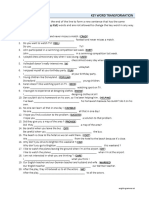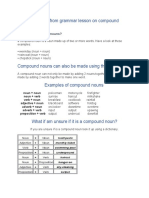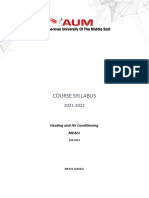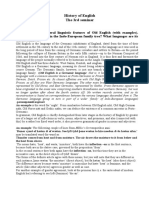Comparative and Superlative Adjectives
Comparative and Superlative Adjectives
Uploaded by
eman abdelhaqCopyright:
Available Formats
Comparative and Superlative Adjectives
Comparative and Superlative Adjectives
Uploaded by
eman abdelhaqCopyright
Available Formats
Share this document
Did you find this document useful?
Is this content inappropriate?
Copyright:
Available Formats
Comparative and Superlative Adjectives
Comparative and Superlative Adjectives
Uploaded by
eman abdelhaqCopyright:
Available Formats
Comparative and Superlative Adjectives
Adjectives are words that describe, identify, or quantify nouns and pronouns. They help
specify our writing by offering more details about nouns and pronouns.
Comparative Adjectives
Comparative adjectives are used to compare two things—they help describe differences between
two nouns.
Comparative Adjective Sentence Formula
Comparative adjectives are generally used in the following sentence
structure: Noun (subject) + verb + comparative adjective + than + noun
(object)
Example Sentence
My television + is + bigger + than + my computer.
My television is bigger than my computer.
In some cases, the sentence will end after the comparative adjective and not include the object
of comparison. This structure is possible when the context has provided enough information to
make the comparison clear.
Example Sentence
My brother is 6 feet tall, but my father is taller. (“than my brother” is implied)
Superlative Adjectives
Superlative adjectives are used to compare three or more things. They help describe things on
either end of a spectrum (e.g., smallest and largest, tallest and shortest).
Superlative Adjective Sentence Formula
Superlative adjectives are generally used in the following sentence structure:
Noun (subject) + verb + the + superlative adjective + noun (object)
Example Sentence
My English professor + is + the + smartest + person.
My English professor is the smartest person.
Just like comparative adjectives, the object of comparison can sometimes be left out.
Example Sentence
We took an exam in class today, and I scored the highest. (“in the class” is implied)
Creating Comparative and Superlative Adjectives
Changing an adjective into its comparative or superlative form depends on the number
of syllables in the base form of the adjective (e.g., small, tall, big).
One-Syllable Adjectives
The suffix -er will be added for comparative adjectives and -est for superlative adjectives. When
the adjective has a single vowel between two consonants (consonant + single vowel +
consonant), the second consonant will be doubled.
Example of a Comparative Adjective with a Single Vowel Between Two
Consonants
Adjective: hot
h (consonant) + o (single vowel) + t (second consonant)
Comparative form: hotter
h (consonant) + o (single vowel) + tt (doubled second consonant) + er (comparative
suffix) In a sentence: The temperature is hotter today than yesterday.
Adjective Comparative Superlative
fast faster fastest
cheap cheaper cheapest
fresh fresher freshest
big bigger biggest
sad sadder saddest
Two-Syllable Adjectives
For comparative adjectives, the suffix -er will be added, or it will be preceded by more. For
superlative adjectives, the suffix -est will be added, or it will be preceded by most. Occasionally,
both forms are used, but one will be more common. When in doubt, use more or most instead of
a suffix. For adjectives ending in y, the y will become an i, and the appropriate suffix will be
added.
Adjective Comparative Superlative
gentle gentler gentlest
clumsy clumsier clumsiest
happy happier happiest
anxious more anxious most anxious
polite more polite most polite
Three Syllables or More
Comparative adjectives will be preceded by more, and superlative adjectives will be preceded by
most.
Adjective Comparative Superlative
important more important most important
attractive more attractive most attractive
embarrassed more embarrassed most embarrassed
Irregular Adjectives and Exceptions
Although there are several rules for writing in English, these rules often have irregularities and
exceptions. Sometimes, the deviants follow a pattern that makes them easy to spot, but this is
not the case for comparative and superlative adjectives. Abnormal adjectives simply have to be
committed to memory.
Irregular adjectives
Adjectives are irregular when their comparative and superlative forms do not adhere to the rules
discussed in this handout. The chart below displays some examples of irregular adjectives.
Adjective Comparative Superlative
good better best
bad worse worst
little less least
much more most
far farther/further farthest/furthest
Exceptions
Adjectives are exceptions to the rules discussed in this handout when they simply do not have a
comparative or superlative form. Some examples include blind, unique, vertical, wrong, left,
intelligent, complete, perfect, etc.
Activity 1
Directions: Complete the sentences with the correct comparative or superlative adjective based
on the adjective provided in parentheses.
1. The Burj Khalifa building in Dubai is the (tall) building in the world.
2. Labradors are (big) than Chihuahuas.
3. We built rockets in physics class today. Mine flew the (high).
4. My necklace is (expensive) than my bracelet.
5. I got a C on my essay, which is (bad) than the 100% I got last time.
6. Homework is (important) than watching television.
7. Watching television makes me (happy) than doing homework.
8. To save money, I am searching for the (cheap) textbooks.
9. My grandmother’s chocolate chip cookies are the (good).
10. Driving on a dirt road is (bumpy) than driving on asphalt.
Answer Key for Activity 1
1. tallest
2. bigger
3. highest
4. more expensive
5. worse
6. more important
7. happier
8. cheapest
9. best
10. bumpier
Activity 2
Directions: Each of the following sentences has an error in the use of comparative or superlative
adjectives. Identify the error and correct it.
1. My bed is more big than my desk.
2. Usain Bolt can run fast than me.
3. You are most generous than my brother.
4. Of all our luggage, mine is the heavier.
5. Michelangelo’s David is the more realistic statue I have ever seen.
6. The weather during the summer is the most hot than during the winter.
7. Frank Ocean is the goodest musician of the decade.
8. The Earth is closest to the moon than the sun.
9. You should always turn in your work because some points are best than no points.
10. The Writing Center is the greater resource for writing help on campus!
Answer Key for Activity 2
1. My bed is bigger than my desk.
2. Usain Bolt can run faster than me.
3. You are more generous than my brother.
4. Of all our luggage, mine is the heaviest.
5. Michelangelo’s David is the most realistic statue I have ever seen.
6. The weather during the summer is hotter than during the winter.
7. Frank Ocean is the best/greatest musician of the decade.
8. The Earth is closer to the moon than the sun.
9. You should always turn in your work because some points are better than no points.
10. The Writing Center is the greatest resource for writing help on campus!
You might also like
- GR 3 Booklet AutoRecovered 1Document210 pagesGR 3 Booklet AutoRecovered 1Ramiz AttaNo ratings yet
- Empower B1 Academic Skills StudentsDocument32 pagesEmpower B1 Academic Skills StudentsLuis Felipe Villamarín GranjaNo ratings yet
- 06le 13 Pa Selfiechanging STDocument4 pages06le 13 Pa Selfiechanging STMohamed Safwat Khater100% (1)
- The Octopus Scientists and The Camouflaged OctopusDocument44 pagesThe Octopus Scientists and The Camouflaged OctopusLeena OsmanNo ratings yet
- Circulatory SystemDocument6 pagesCirculatory SystemchelliNo ratings yet
- Lesson Plan Gr. 4 Mathematics LengthDocument18 pagesLesson Plan Gr. 4 Mathematics LengthbabongilevaniNo ratings yet
- English Online 1Document1 pageEnglish Online 1A. G.No ratings yet
- Examples:: Dis + Approve Disapprove (Not Approve) Non + Toxic Nontoxic (Not Toxic) Un + Happy Unhappy (Not Happy)Document8 pagesExamples:: Dis + Approve Disapprove (Not Approve) Non + Toxic Nontoxic (Not Toxic) Un + Happy Unhappy (Not Happy)Alisa BilokinNo ratings yet
- Task 2. Reading ComprehensionDocument3 pagesTask 2. Reading ComprehensionyuliapiaiNo ratings yet
- Present Continuous Presentation PDFDocument11 pagesPresent Continuous Presentation PDFfatuxaNo ratings yet
- Grade 6 Social Studies Weeks 1-4 Worksheets - Term 2Document48 pagesGrade 6 Social Studies Weeks 1-4 Worksheets - Term 2hummeraillahiNo ratings yet
- Introduction To Poetry & Icarus FlightDocument42 pagesIntroduction To Poetry & Icarus FlightDALAL HATTAN100% (1)
- Simple PresentDocument30 pagesSimple PresentChristopher Donnie SinagaNo ratings yet
- Compare and Contrast: Desert Tropical RainforestDocument3 pagesCompare and Contrast: Desert Tropical RainforestilovebalotelliNo ratings yet
- Name - : 5 Grade MathDocument16 pagesName - : 5 Grade MathCharity GarnerNo ratings yet
- Parts of Speech - Full BookDocument45 pagesParts of Speech - Full BookAISHWARYA EDUCATIONNo ratings yet
- Life Doesn't Frighten Me - QuizizzDocument5 pagesLife Doesn't Frighten Me - QuizizzMica Ella Madria BulananNo ratings yet
- Name: Teacher: Date: Score:: Identify and Calculate The Perimeter For Each TriangleDocument2 pagesName: Teacher: Date: Score:: Identify and Calculate The Perimeter For Each TrianglepsaayoNo ratings yet
- Q3 WEEK 5 EnglishDocument162 pagesQ3 WEEK 5 EnglishMARITES CAŇOVAS LUCING100% (1)
- Unit 3 - Measurement - Part 1: Assignment Title Notes To Self CompleteDocument21 pagesUnit 3 - Measurement - Part 1: Assignment Title Notes To Self Completeapi-507790029No ratings yet
- ParallelismDocument2 pagesParallelismHamid HeidariNo ratings yet
- Adjectives and Adverbs: Here Starts The Lesson!Document23 pagesAdjectives and Adverbs: Here Starts The Lesson!Katherine Caballero Rivero100% (1)
- Discussion Essay: Supporting 1Document3 pagesDiscussion Essay: Supporting 1Quang HuyNo ratings yet
- Using The Apostrophe PDFDocument2 pagesUsing The Apostrophe PDFYargul RayhanNo ratings yet
- English Adverb PresentationDocument29 pagesEnglish Adverb Presentationjames danicaNo ratings yet
- Silent LetterDocument4 pagesSilent LetterMonk DhariwalNo ratings yet
- Grammar Exam 1Document3 pagesGrammar Exam 1TinTinNo ratings yet
- Multiples and Factors ChartDocument1 pageMultiples and Factors Chartapi-373222932No ratings yet
- PronounsDocument66 pagesPronounsJess WangNo ratings yet
- GarbageDocument4 pagesGarbagefranciscogarridoNo ratings yet
- Horned Toad PrinceDocument82 pagesHorned Toad Princeacrawford_1120No ratings yet
- Comparatives and Superlatives ExerciseDocument3 pagesComparatives and Superlatives ExerciseAna ChanNo ratings yet
- Key Word TRansformationDocument1 pageKey Word TRansformationFabiola RobledoNo ratings yet
- U2W5 One Good Turn Deserves AnotherDocument140 pagesU2W5 One Good Turn Deserves AnotherJaviera BlameyNo ratings yet
- Gerunds and Infinitives Extra ExerciseDocument5 pagesGerunds and Infinitives Extra ExerciseSevgi Saime CertelNo ratings yet
- HE Ollective OUN: Recognize A Collective Noun When You See OneDocument6 pagesHE Ollective OUN: Recognize A Collective Noun When You See OneDorina DanilaNo ratings yet
- 1.1 Parts of Speech and Simple Present 3CCDocument5 pages1.1 Parts of Speech and Simple Present 3CCGabriel PR100% (1)
- Landforms and Bodies of Water: Complete Each Sentence With A Word From The Box. Some Words Will Not Be UsedDocument2 pagesLandforms and Bodies of Water: Complete Each Sentence With A Word From The Box. Some Words Will Not Be UsedRob ClosasNo ratings yet
- What Will I Learn From Grammar Lesson On Compound Nouns?Document7 pagesWhat Will I Learn From Grammar Lesson On Compound Nouns?Irina MBNo ratings yet
- SuffixesDocument2 pagesSuffixesAmila Grahovic100% (2)
- 9.conjunction Combined PDFDocument43 pages9.conjunction Combined PDFAbhinav PandeyNo ratings yet
- B Level Writing Booklet 1st TermDocument84 pagesB Level Writing Booklet 1st TermNecdet AğcaNo ratings yet
- Comprehension WorksheetDocument14 pagesComprehension WorksheetShaima RoseNo ratings yet
- 5-Summer Reading Assignment 5th GradeDocument11 pages5-Summer Reading Assignment 5th GradeSydngsoft NguyenNo ratings yet
- AUM Syllabus - Spring 22Document11 pagesAUM Syllabus - Spring 22Wadha AlmishwatNo ratings yet
- Worksheet Works Comparative and Superlative Adjectives 2Document3 pagesWorksheet Works Comparative and Superlative Adjectives 2Bongkotratt CharuchindaNo ratings yet
- Week 15 - Transcript - What's My Favorite RestaurantDocument1 pageWeek 15 - Transcript - What's My Favorite RestaurantWilthNo ratings yet
- English Speaking CountryDocument16 pagesEnglish Speaking CountryKamilla NizamovaNo ratings yet
- Pronoun Antecedent Agreement Complete PacketDocument6 pagesPronoun Antecedent Agreement Complete PacketpoohlNo ratings yet
- Notes LLB Part 2Document36 pagesNotes LLB Part 2ruqaiya.naeem1986No ratings yet
- Nouns TestDocument2 pagesNouns TestMaggie Mulligan100% (2)
- Paper of The Types of PhrasesDocument12 pagesPaper of The Types of PhrasesARUNo ratings yet
- Different Landforms: by Jena CarrollDocument20 pagesDifferent Landforms: by Jena CarrollMeredith AlexanderNo ratings yet
- English RevisionDocument21 pagesEnglish RevisionNam Phong Nguyen Huu100% (1)
- Compare and Contrast WhalesDocument2 pagesCompare and Contrast WhalesJR Alabat AmoyajNo ratings yet
- English Articles Test 001 PDFDocument3 pagesEnglish Articles Test 001 PDFroxanaNo ratings yet
- Fourth Grade Reading Street Unit 1.5 Letters Home From Yosemite Genre: Narrative NonfictionDocument2 pagesFourth Grade Reading Street Unit 1.5 Letters Home From Yosemite Genre: Narrative Nonfictionapi-291818379No ratings yet
- English AB PDFDocument192 pagesEnglish AB PDFMyriam100% (1)
- Comparative and Superlative AdjectivesDocument5 pagesComparative and Superlative AdjectivesYoussef BrsNo ratings yet
- Comparative and Superlative AdjectivesDocument6 pagesComparative and Superlative AdjectivesAzazel wellsNo ratings yet
- Comparative and Superlative AdjectivesDocument4 pagesComparative and Superlative AdjectivesYosienta CahyandiniNo ratings yet
- Art Is Only Worth What People Will Pay For ItDocument3 pagesArt Is Only Worth What People Will Pay For Iteman abdelhaqNo ratings yet
- Grammar Quiz (Superlative Adjectives)Document1 pageGrammar Quiz (Superlative Adjectives)eman abdelhaqNo ratings yet
- RC Practice 3Document8 pagesRC Practice 3eman abdelhaqNo ratings yet
- Derivation QuizDocument1 pageDerivation Quizeman abdelhaqNo ratings yet
- Module 1Document26 pagesModule 1eman abdelhaqNo ratings yet
- Monkey's Paw Vocab ListDocument1 pageMonkey's Paw Vocab Listeman abdelhaqNo ratings yet
- Quantifiers QuizDocument1 pageQuantifiers Quizeman abdelhaqNo ratings yet
- G7 Diagnostic ExamDocument5 pagesG7 Diagnostic Exameman abdelhaqNo ratings yet
- Worksheet 2Document4 pagesWorksheet 2eman abdelhaqNo ratings yet
- Vocabulary Quiz 1Document2 pagesVocabulary Quiz 1eman abdelhaqNo ratings yet
- Reading Comprehension AssessmentDocument4 pagesReading Comprehension Assessmenteman abdelhaqNo ratings yet
- Grade 8 National LTP 2022Document6 pagesGrade 8 National LTP 2022eman abdelhaqNo ratings yet
- Diagnostic ExamDocument7 pagesDiagnostic Exameman abdelhaqNo ratings yet
- semester Plan 8th-2خطة لغة انجليزية ثامن فصل اول 2017Document3 pagessemester Plan 8th-2خطة لغة انجليزية ثامن فصل اول 2017eman abdelhaqNo ratings yet
- The High 5 Reading Strategy Is A Simple and Effective Approach Formulated To Enhance The Comprehensive Abilities of StudentsDocument1 pageThe High 5 Reading Strategy Is A Simple and Effective Approach Formulated To Enhance The Comprehensive Abilities of Studentseman abdelhaqNo ratings yet
- Journal Writing As A Teaching Technique To Unleash Student CreativityDocument2 pagesJournal Writing As A Teaching Technique To Unleash Student Creativityeman abdelhaqNo ratings yet
- Detailed Lesson PlanDocument6 pagesDetailed Lesson Planeman abdelhaqNo ratings yet
- Passive VoiceDocument6 pagesPassive VoiceNanda100% (1)
- History of English 3Document9 pagesHistory of English 3VLAD DRAKULANo ratings yet
- PART 1 - Simple Past Lesson Plan + Answer KeyDocument3 pagesPART 1 - Simple Past Lesson Plan + Answer Keyali bettaniNo ratings yet
- ContraLing - Week 2 - Worksheet - 0924Document8 pagesContraLing - Week 2 - Worksheet - 0924Gia HuyNo ratings yet
- Final Interview Guide-HintsDocument4 pagesFinal Interview Guide-HintsDimple BolotaoloNo ratings yet
- Who - WhomDocument2 pagesWho - WhomCapital Rooms HotelNo ratings yet
- English III UIDNSDocument2 pagesEnglish III UIDNSSarah OmarNo ratings yet
- Question Words Conversation TeacherDocument2 pagesQuestion Words Conversation TeacherSam Espinosa100% (1)
- Rooftops 1 Programacion LOMCE Ingles MECDDocument208 pagesRooftops 1 Programacion LOMCE Ingles MECDCENAMORNo ratings yet
- Infinitives and Gerunds Verb Patterns Activities With Music Songs Nursery Rhymes Fun Act 140092Document19 pagesInfinitives and Gerunds Verb Patterns Activities With Music Songs Nursery Rhymes Fun Act 140092Tú NguyễnNo ratings yet
- All Clear kl8 Short Tests Unit7Document4 pagesAll Clear kl8 Short Tests Unit7mirek0059No ratings yet
- Igbo Value and Care For Life: Universidad de NavarraDocument61 pagesIgbo Value and Care For Life: Universidad de NavarraIbrahim QariNo ratings yet
- Sounds of EnglishDocument7 pagesSounds of Englishsonu sainiNo ratings yet
- LAE IV Bloque IV (III) OficialDocument18 pagesLAE IV Bloque IV (III) OficialPao MoralesNo ratings yet
- Easter Term TestDocument13 pagesEaster Term Testzephyrexe89No ratings yet
- 13.4 Past Participles Used As Adjectives: Ante TodoDocument6 pages13.4 Past Participles Used As Adjectives: Ante TodoFajar SantosoNo ratings yet
- Fisa de Lucru 1Document2 pagesFisa de Lucru 1Madoșa TimeeaNo ratings yet
- SEmanticsDocument30 pagesSEmanticssamiza1122No ratings yet
- New Language Leader 3 Secondary Education: Study and Writing SkillsDocument19 pagesNew Language Leader 3 Secondary Education: Study and Writing SkillshNo ratings yet
- The Direct Method: It Is Also Called Natural Method Because It Is Learnt Naturally LikeDocument3 pagesThe Direct Method: It Is Also Called Natural Method Because It Is Learnt Naturally LikeSa MiraNo ratings yet
- Communication Skills: Spoken EnglishDocument12 pagesCommunication Skills: Spoken EnglishRohit ChaudharyNo ratings yet
- Igпвhgгs: Ехрrеss PublishiшgDocument60 pagesIgпвhgгs: Ехрrеss PublishiшgSasha VivcharenkoNo ratings yet
- Kì Thi Chọn Học Sinh Giỏi Lớp 9 Cấp Tỉnh Năm Học 2020 - 2021 Môn Tiếng Anh - Sở Giáo Dục Và Đào Tạo Gia LaiDocument14 pagesKì Thi Chọn Học Sinh Giỏi Lớp 9 Cấp Tỉnh Năm Học 2020 - 2021 Môn Tiếng Anh - Sở Giáo Dục Và Đào Tạo Gia Laithuynl1984No ratings yet
- LET Reviewer For EnglishDocument12 pagesLET Reviewer For Englishmichelle gomezNo ratings yet
- Natural Language Processing-Based Solution For Accurate Transcription and Translation of Distorted Multilingual Audio SignalsDocument4 pagesNatural Language Processing-Based Solution For Accurate Transcription and Translation of Distorted Multilingual Audio SignalsInternational Journal of Innovative Science and Research TechnologyNo ratings yet
- Foreign Language Midterm NotesDocument24 pagesForeign Language Midterm Noteschloekent loreNo ratings yet
- Mohamed Haron Interchange Intro Test (Units 14, 15,16) PDFDocument4 pagesMohamed Haron Interchange Intro Test (Units 14, 15,16) PDFايليت اكاديمىNo ratings yet
- Task 1 Annotation and The 3 Phases of ReadingDocument4 pagesTask 1 Annotation and The 3 Phases of Readingsilvana cabrera iturraranNo ratings yet
- Transitive and Intransitive VerbsDocument2 pagesTransitive and Intransitive Verbsyosef melkaNo ratings yet










































































































